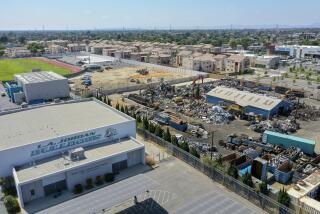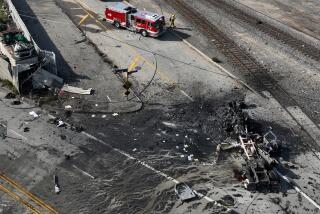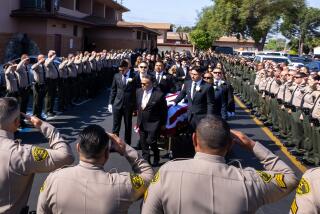Deadly Texas fertilizer explosion was preventable, authorities say
The deaths of 15 people, including 12 volunteer firefighters, in an explosion at a Texas fertilizer plant a year ago were preventable, federal investigators said Tuesday.
Preliminary findings from the U.S. Chemical Safety Board on the chemical disaster in West, Texas, include:
- The firefighters should have been trained to deal with the stockpile of ammonium nitrate at West Fertilizer Co.
- State regulators should not have allowed the fertilizer to be stored in wooden containers.
- Local authorities should have considered keeping schools and homes farther away from the plant.
The plant exploded after a fire detonated about 30 tons of ammonium nitrate held in wooden bins, the Chemical Safety Board said. State investigators said they couldn’t be sure what happened, but narrowed the cause of the fire to three possibilities: arson, overheating of a golf cart battery or an electrical malfunction. Combustible seeds at the facility helped fueled the blaze.
Firefighters responded to the “intense and out of control” fire, and the powerful blast occurred 20 minutes later, the safety board said. Emergency responders had no idea about the explosion hazard, the board concluded.
About 200 people were injured. A school, an apartment building and more than 200 homes and other structures were destroyed or damaged. Insurance officials said property damage exceeded $100 million. About 70 homes have since been rebuilt near the site, local officials recently said.
The Chemical Safety Board’s findings could add pressure on Texas lawmakers to craft legislation aimed at preventing another tragedy.
“It should never have occurred,” Chemical Safety Board Chairman Rafael Moure-Eraso said. “It resulted from the failure of a company to take the necessary steps to avert a preventable fire and explosion and from the inability of federal, state and local regulatory agencies to identify a serious hazard and correct it.”
The three-person board of presidential nominees is charged with investigating serious chemical accidents, but does not have the power to issue fines.
The board criticized Texas’ lack of a state fire code and its ban on small communities such as West from adopting fire codes. But it’s unlikely those policies would change, lawmakers said last week. Instead, state Rep. Joe Pickett said he’s hoping to draft narrow legislation by early July to deal with ammonium nitrate storage.
The state fire marshal’s office said 46 of about 100 facilities with ammonium nitrate use wooden containers, which need to be swapped out for concrete containers or be outfitted with sprinklers, among other possibilities.
“There has to be some changes if you want to prevent another West,” Texas Fire Marshal Chris Connealy told lawmakers during a televised hearing last week. He said the industry seems “somewhat receptive.”
“They understand there has to be some changes post-West. A non-combustible structure I think is doable,” Connealy said.
State officials also have called for funding firefighter training on chemical blasts.
“I don’t think what we’re proposing is too onerous,” said Pickett, chairman of the House’s Homeland Security and Public Safety Committee. “Public safety is paramount here. I don’t think we’ll step on too many toes.”
Despite a history of deadly chemical incidents, Texas has long spurned stringent regulations, citing in part the high costs it would impose on businesses. In the wake of last April’s blast in West, near Fort Worth, many residents said accidents were something that they just have to accept.
“The Chemical Safety Board found at all levels of government a failure to adopt codes to keep populated areas away from hazardous facilities, not just in West, Texas,” Supervisory Investigator Johnnie Banks said in a statement, noting that 1,351 facilities across the country store ammonium nitrate.
Texas facilities are undergoing voluntary inspections by state officials, who in turn have been holding community meetings near those sites to discuss ammonium nitrate. But the Chemical Safety Board said a complete regulatory system is needed.
Last year, the U.S. Occupational Safety and Health Administration fined Adair Grain Inc., which owned the West plant, $118,000 for 24 violations in connection with the explosion. More than 100 people have joined lawsuits against the company.
The company declined to comment until it had a chance to review the findings. Texas Gov. Rick Perry’s office didn’t respond to a request for comment.
Follow LATimes National on Facebook
ALSO:
Supreme Court upholds Michigan ban on affirmative action
Oklahoma grapples with death penalty issues after court ruling
Police can stop vehicles based on anonymous 911 tips, justices rule
More to Read
Sign up for Essential California
The most important California stories and recommendations in your inbox every morning.
You may occasionally receive promotional content from the Los Angeles Times.










